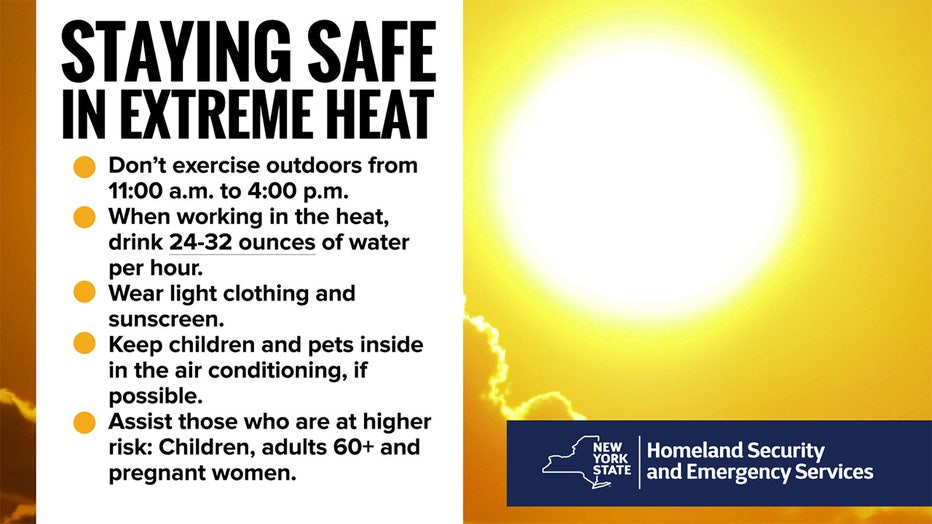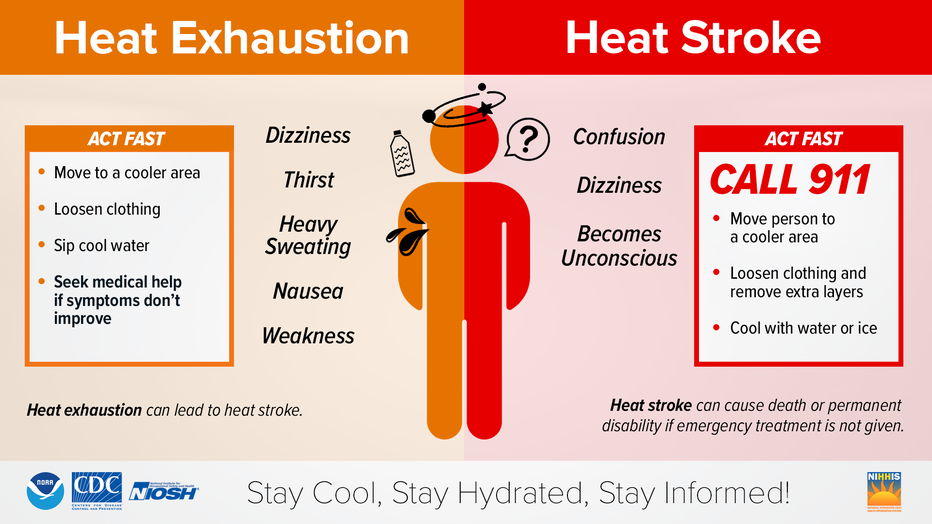Heat wave 2024: Essential tips to stay safe in NYC
NEW YORK CITY - The first heat wave is set to smother the NYC area this week, with humidity and near-record temperatures that could pose serious health risks to some New Yorkers.
JUMP TO: INDOOR l OUTDOOR l CHILDREN l PETS
"Heat waves can be dangerous — with one expected this week, I encourage New Yorkers to take precautions necessary to stay safe and avoid exhaustion," Gov. Kathy Hochul said on Monday. "Keep an eye on your local forecast, stay hydrated and postpone outdoor activity as much as possible."

New Yorkers brace the heat
Temperatures are expected to soar upwards of 20 degrees above what is typical in mid-June, with heat indices in the dangerous range. FOX 5 NY's Michelle Ross has the latest from outside.
From indoor and outdoor heat safety, to your children and pets, here are some essential tips to keep cool and safe:
Prepare in advance for extreme heat
- Sign up for NY alerts that can come to your phone and email and other alerts offered in your local community.
- Create a family emergency plan and include a plan to stay cool.
- Install air conditioners and insulate around them, cover windows that receive morning or afternoon sun and set up fans to increase air flow.
- You may qualify for a free air conditioning unit. The Home Energy Assistance Program (HEAP) can provide an air conditioning unit to income eligible households that include someone with a documented medical condition exacerbated by extreme heat, or households with young children or older adults. Applications will continue to be accepted until funding runs out. For more information, visit the Office of Temporary and Disability Assistance website or contact your local office for the aging at 1-800-342-9871.
- Attend a free Citizen Preparedness Corps training for residents and get the tools and resources to prepare for emergencies.

Credit: New York State Division of Homeland Security
Indoor heat safety
If it reaches above 90° in your home:
- Set your air conditioning unit to at least 78° or "low cool" to be safe, comfortable and save money. This could save your life.
- Close window shades or curtains.
- Try not to use your stove and oven.
- Take a cool shower or bath (not a freezing one).
- Drink plenty of water, even if you are not thirsty.
- Avoid drinks with alcohol, caffeine or lots of sugar.
- Older adults and others who may be sensitive to extreme heat should contact friends, neighbors, or relatives at least twice a day during a heat wave. If you know anyone who is elderly and/or heat sensitive, be a buddy and check in on them frequently during extreme heat.
Outdoor heat safety
Stay safe outdoors with these tips:
- Avoid strenuous physical activity.
- Drink plenty of water, even if you are not thirsty.
- Stay in the shade and out of direct sun.
- Wear light, loose-fitting clothes.
- Put a hat on to protect your face and head.
- Use sunscreen with SPF 15 or higher.
- Limit outdoor activities to early morning and late evening hours.
- Avoid drinks with alcohol, caffeine or sugar.
Know the Signs of Heat Illness

Credit: NOAA
Heat stroke occurs when the body's temperature rises quickly, which can lead to death. Call 911 or go to an emergency room if you or someone you know has the following symptoms
- Hot, dry skin
- Confusion, hallucinations and disorientation
- Loss of consciousness or being unresponsive
- Nausea or vomiting
- Trouble breathing
- Fast, strong pulse
- Weakness
- Dizziness
People suffering from heat exhaustion need to get to a cool place, remove extra clothes and drink lots of water. Symptoms to look for:
- Heavy sweating
- Cold, clammy skin
- Muscle cramps
- Lightheadedness or feeling faint
- Headache
- Decreased energy
- Loss of appetite or nausea
Safety tips for children
- Never leave a child in an unattended vehicle in the warm weather, not even with the windows slightly open or down, due to the risk of heatstroke (hyperthermia).
- If you see a child in a hot car, call 911 right away and follow their instructions. Emergency personnel are trained to respond.
- Teach children not to play in or around vehicles and to alert an adult when a friend is playing in a vehicle without supervision. Make sure children understand the dangers of trunk entrapment (suffocation, heatstroke, etc.).
- Place something you need, like keys, a purse or bag, or your cell phone, next to your child's car seat so you will remember to check the backseat before you lock the car. Alternatively, place a stuffed toy in your child’s car seat when not in use and move the toy to the front passenger seat when your child is in his/her car seat as a reminder that your child is in the vehicle.
- Use drive-through services whenever possible while driving with a child in a vehicle.
- It is vital to recognize the symptoms of heatstroke in children. Symptoms include absence of sweat, confusion, disorientation, flushed skin, loss of alertness, unconsciousness or rapid/shallow breathing.
Keep your pets safe
- Avoid dehydration: Pets can dehydrate quickly, so give them plenty of fresh, clean water.
- Walk your dog in the morning and evening: When the temperature is very high, do not let your dog linger on hot asphalt. Your pet’s body can heat up quickly, and sensitive paw pads can burn.
- Know when your pet is in danger: Symptoms of overheating in pets include excessive panting or difficulty breathing, increased heart and respiratory rate, drooling, mild weakness, unresponsiveness, or even collapse.
Conserve Power
It is important to save as much energy as possible during hot, humid summer months when people can use a lot of electricity.
- Steps you can take to prevent an outage include:
- Set your air conditioner thermostat no lower than 78 degrees.
- Use the air conditioner when you are home. If you want to cool your home before you return, set a timer that turns on no earlier than 30 minutes before you arrive.
- Turn off nonessential appliances.
- Have emergency supplies on hand in case of an outage. If you lose power, notify your utility provider immediately.
- If you lose power, notify your utility provider immediately.
You can learn more from Con Edison and PSEG Long Island about how you can save energy (and money on your energy bill).
New York City has opened cooling centers all across the city to help New Yorkers stay safe. To find your local cooling center, visit finder.nyc.gov/coolingcenters or call 311.
The Parks Department also has updated its Cool It! NYC map to help New Yorkers find places near them to hydrate, refresh, and stay in the shade.


